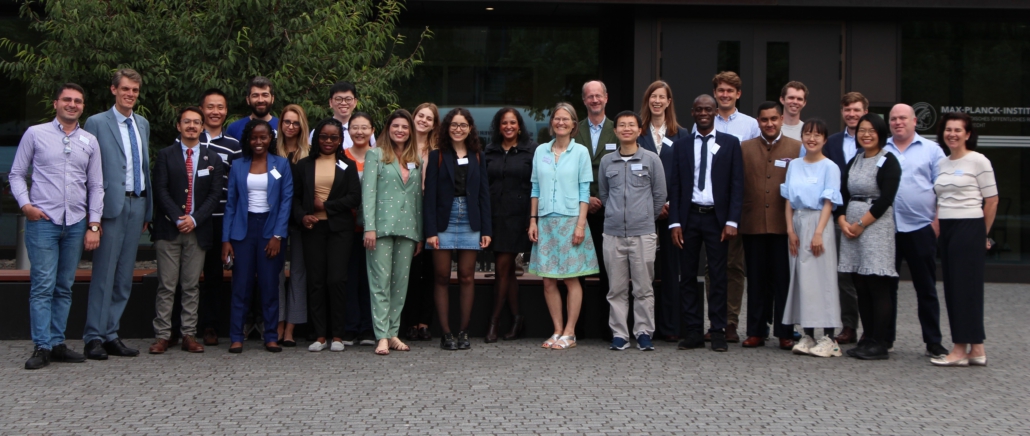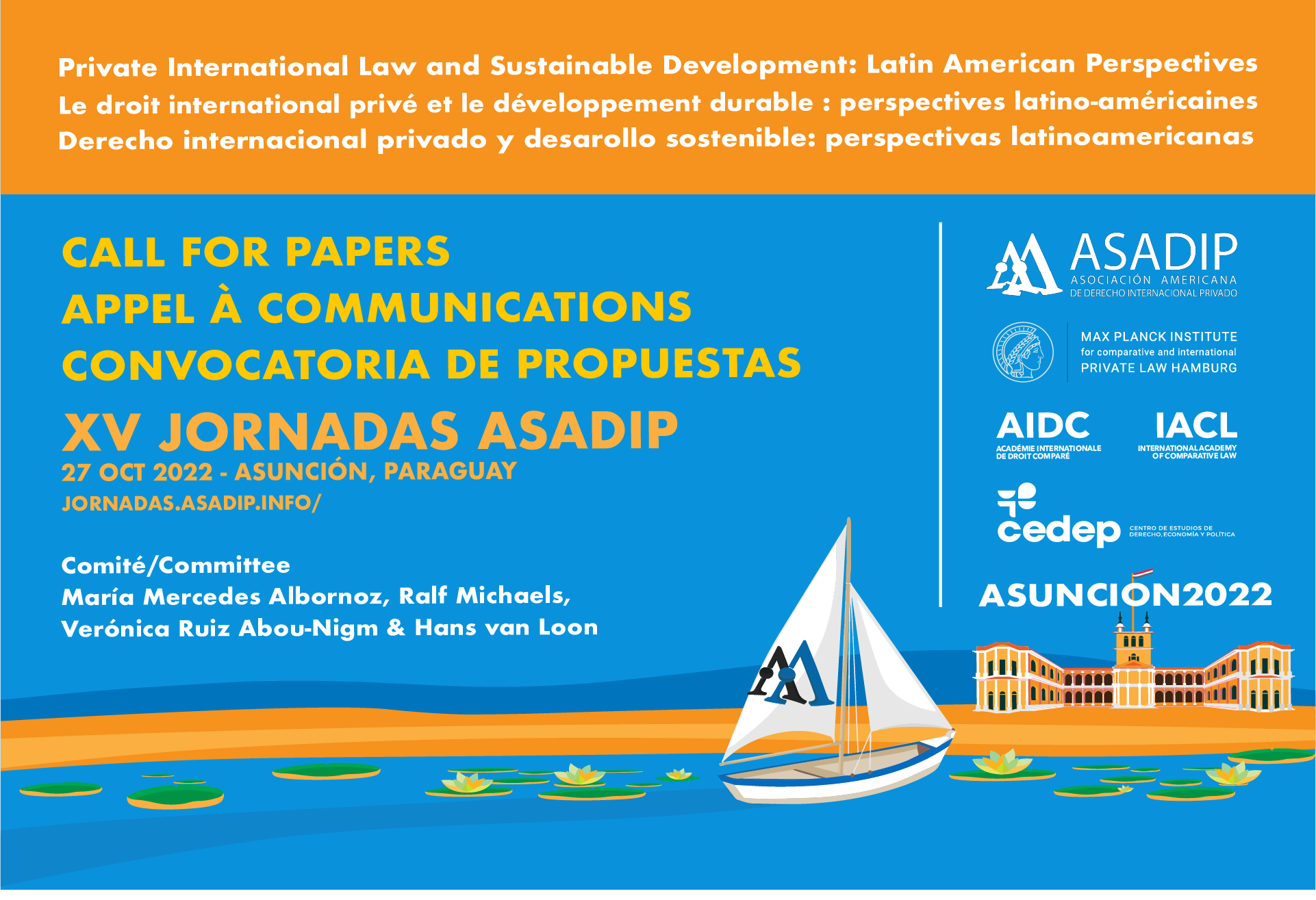Report: Summer School on the new Foreign Relations Law, MPIL Heidelberg, June 8-10, 2022
Report on the
Summer School on the new Foreign Relations Law
MPIL Heidelberg, June 8-10, 2022
by Zixuan Yang and Jakob Olbing*

The MPIL in Heidelberg hosted a three-day Summer School titled “Populism and the New Foreign Relations Law: Between Public International Law, ‘External Public Law’, and Conflict of Laws”, led by Anne Peters (MPI Heidelberg), Karen Knop (University of Toronto and Max Planck Law Fellow), and Ralf Michaels (MPI Hamburg). The Summer School, which brought together 20 young scholars, was also the first step in a large-scale research project that Karen Knop will lead in the coming years as one of the first Max Planck Law Fellows.
The aim of the Summer School was to familiarize the participants with foreign relations law, a field which is known in only a few countries, and to examine its relationship to conflict of laws and international law. Led by the three hosts, the participants engaged in lively discussions on the presented topics, thus bringing together their diverse professional and national backgrounds. The results of the Summer School will not be published as such but will instead fuel and direct the joint research project within the Max Planck Law Fellowship Program. Karen Knop is one of the first five Fellows of the Program and is going to collaborate with Anne Peters, director at the MPI Heidelberg and Ralf Michaels, director at the MPI Hamburg on the project for the next few years.
Foreign Relations Law as a law in between
The Summer School began with the observation that few of the many nations represented identified foreign relations law as a distinct area of law. In Germany, one of the few countries having such a field of law, it is known as Staatsrecht III. From a comparative law perspective, however, it is difficult to define this new field of law in a general way. This also generates questions of whether such a field of law is needed at all or which particular issues it should govern, as the possible area of regulation is to a large extent covered by other areas of law, namely international law, conflict of laws, constitutional law, and administrative law as well as by the field of diplomacy. However, there is a variety of situations that cannot be assigned clearly to any of these established areas of law, thus highlighting the question if they should be assembled in a new field. Why, for instance, is the legality of a demonstration in front of an embassy often subjected to different rules and standards than other demonstrations? May South Korean “comfort women” compel the South Korean government to negotiate with Japan for compensation for their suffering during the war? Why is a claim for compensation for a death caused by the exercise of excessive police force dismissed when the fatal shooting occurred across an international border? Do such cases even fall under a court’s jurisdiction or is it rather a task of diplomacy to find a solution?
These and many other cases clearly show that there is room for a new field of law which should be explored with closer attention. However, the field’s further development should not – as has been the case so far – be left to a few Western countries; rather, the perspectives of other countries should also be included. Precisely this creation of new perspectives was one of the core aims of the Summer School. According to Karen Knop, the still young field of law is in danger of falling victim to populist politics. She understands populism not as an ideology but as a method for the demarcation and devaluation of all things “international” vis-à-vis what is deemed national. This concern was illustrated by the “take back control” slogan of the Brexit campaign, alleging that the EU institutions have little or no democratic legitimacy. The withdrawal from international treaties and organizations is a phenomenon that can, indeed, be observed in many countries. This dynamic should not be encouraged by foreign relations law through its establishment as a substitute for international law.
But are general concerns against international law as undemocratic justified or is the opposite the case? Case studies presented by Anne Peters illustrated how the ratification of international public law treaties – or the withdrawal from such treaties – may or may not be democratically legitimized. Can the executive of a state withdraw from the International Criminal Court without involving the legislative?
Foreign Relation Law as international or domestic law?
On the one hand, one can try to find a solution in public international law, but most treaties or conventions don’t entail provisions on withdrawal. Until Brexit, the sentiment rather was that more and more states will join a treaty or convention, not leave. On the other hand, national law could give an answer, when adopting a foreign relations law perspective. Though, in many countries public international law is, in some way or another, incorporated into the national law, legislatives have little opportunities to influence its content, since most treaties are negotiated between the state’s representatives. Also, judicial review is very limited concerning public international law. When developing foreign relations law, one could and should address these concerns. As Anne Peters put it: one has to normalize foreign relations law, by subjecting it to judicial review, providing stronger democratic legitimation and figuring out if and when a foreign set of facts should be treated different to a domestic, and when not.
Foreign Relations Law as a voice for unheard actors
It was highlighted throughout the three days that especially in smaller less economically strong countries, the recognition of foreign relations law as an independent field of law next to public international law could be very important. It could provide additional funding to a notoriously underfunded field of law. Normally those countries, mostly members of the global south, have only little chance in being heard, for example when treaties are negotiated. This is even more important as public international law has a long and controversial colonial legacy dating back to the history of imperial politics until the mid-20th century. To move from the colonial global north/south hierarchy and reframe foreign relations law, it is important to reflect whether there is a universal model and criteria for foreign relations law on a global level. In this sense, voices from different sides should all contribute to the formation of this new field of law.
Foreign relations law should also give a voice to actors who have never been heard in international law. Taking a historical and comparative perspective it should be a Post-Colonial foreign relations laws, encouraging non-state participants such as indigenous people to have a say. From a post-colonial perspective, it is also necessary to open up foreign relations to indigenous peoples to facilitate other forms of cross-border disputes and cooperation. Karen Knop raised the example of the Arctic Council, in which both states and indigenous peoples of the polar region are represented and participate in sustainable development and environmental protection.
Foreign Relations Law and Private International Law
But how to proceed? How can all these voices come together in a new area of law? Ralf Michaels introduced private international law methodology as an example for how to accommodate the different actors. He illustrated the already existing interdependency between foreign relations law and private international law through a series of cases of the U.S. Supreme Court. This interdependency should be further discussed and can offer new perspectives and has a future potential for both sides.
The traditional methodology of private international law is considered to be apolitical and neutral. However, it can also be influenced by diplomatic or policy considerations when certain public elements are involved. In a cross-border shooting case, Hernandez et al. v. MESA, a Mexican national assumed to have illegally crossed the border was shot to death on Mexican soil by a U.S. Border Patrol Agent who stood on U.S. soil. The claim for compensation was dismissed by the U.S. court. The agent’s duty to protect the border from illegal crossings was an act of foreign relations and therefore is ‘exclusively entrusted to the political branches’ and should be immune from judicial inquiry. Based on the separation of power, the court refrained itself from arbitrating on diplomatic matters. Granting such ‘private’ claims would also have the risk of undermining national security, the court said. There are other tension between national security and private international law. A recent general ban on Sharia and International law in several U.S. States Courts demonstrates populist arguments influence into public policy and against the application or recognition of foreign laws, values and beliefs.
When it comes to the determination of the content of foreign law, ‘comity’ in foreign relations provide a basis for the forum’s treatment of foreign law. In Animal Science Products, the U.S. Supreme Court ruled that respectful considerations should be given to the foreign government’s submission on its own law, however, the federal court is not bound to accord conclusive effect to it. Furthermore, comity also plays an important role for the court to determine the territorial reach of domestic law in international cases. The Supreme Court’s decision in Empagran concerned an antitrust class-suit alleging the application of the Sherman Act even though the alleged conduct and harm were occurred significantly on foreign territory. Justice Breyer’s statutory interpretation and justification for limiting the scope of U.S. antitrust law in this case was discussed to rethink the nature of the U.S. federal court’s long standing Charming Betsy principle, also known as the presumption against extraterritoriality.
Foreign Relations Law as a Law of opportunities
It might seem an impossible task to accommodate all these interests and participants into a new foreign relations law and at the same time follow a coherent methodology. But a new field of law gives the opportunity to address issues, which long have been left aside or completely ignored despite the factual relevance and to find creative answers. Indigenous people have been interacting with another across borders since borders where put in place. States where entering into treaties all the time, policemen are shooting everywhere and anyone (in the US) and occasionally across a border and after a war, victims are (sometimes) compensated for their losses by the alien. All the cases have a foreign element, so maybe private international law can provide one solution, as it is his task to provide clear answers to international complex cases, and its methods are designed to accommodate international cases. Its aims of uniformity and certainty of results could also benefit foreign relations law. Another solution could be provided within the framework of global constitutionalism, as Anne Peters suggested. Developing a foreign relations law within the global institutions of public international law, such as the United Nations, by means of diplomacy and treaty making to create a uniform body of law.
After three days filled with sessions, discussions, and lively conversations, the participants departed with the strong sense that the foundation for the further development of foreign relations law had been laid together. As a parting gift, the three hosts wished for a further development of the learned and encouraged the participants to publish the newly made findings. Given the many newly made contacts – woven diligently after the long break due to the Covid-19 pandemic – it is merely a question of time that co-authored publications will appear.
* Zixuan Yang and Jakob Olbing are PhD students under Ralf Michaels at the Max Planck Institute for Comparative and International Private Law, Hamburg.

